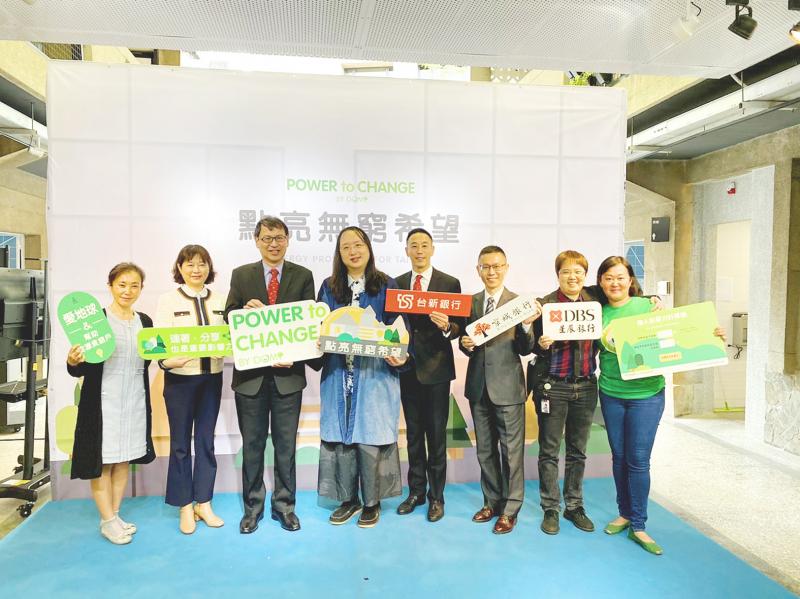Taishin International Bank (台新銀行), DBS Bank Taiwan (星展銀行) and King’s Town Bank (京城銀行) are working with social enterprise Domi Earth Co (綠然能源) to promote electronic bills, planning to use the money saved to help those in need.
Taishin Bank, the banking arm of Taishin Financial Holding Co (台新金控), has 6 million credit card clients, Taishin Bank senior vice president Cres Huang (黃天麟) told a news conference in Taipei yesterday.
About 1 million of them receive electronic bills, he said.

Photo: Kao Shih-ching, Taipei Times
Although some people think that only younger clients prefer electronic bills, many credit card holders in their 50s receive digital bills, as this saves them trouble recycling the papers, he said.
“Users must feel comfortable with the bank’s digital tools. Otherwise they would not be willing to change,” he said.
The bank could save NT$960,000 (US$33,761) per year if 10,000 cardholders who receive paper bills opted for digital bills, he said.
Some of the money saved due to phasing out paper bills, which cost the bank NT$8 per cardholder per month, would be allocated to a project with Domi Earth to help poor families who struggle to pay utility fees, Huang said.
The project would support them by installing energy-efficient light bulbs and home appliances, which would help them reduce fixed costs, he said.
King’s Town Bank spokesman You Qi-wei (尤其偉) said that the bank is conducting a similar project.
DBS Bank Taiwan head of digital banking Happy Ho (何益萍) said that 60 percent of the bank’s clients receive electronic bills, adding that this share would likely rise this year.
The three banks have suggested that the Financial Supervisory Commission amend financial regulations to accelerate the transition to paperless banking, the three bank representatives said.
“We must offer paper bills unless customers opt out of the service. That is not helpful for the paperless transition,” they said.
Many people have concerns about plastic straws’ impact on the environment, but carbon emissions due to banks’ bills are even higher than those of plastic straws, Domi Earth founder Tammy Hu (胡德琦) said.
About 70 million sets of paper bills are produced in Taiwan every month, Hu said, adding that they are sent from banks, telecoms, Taiwan Power Co (台電), Taiwan Water Corp (台水) and gas companies.
Over a year, that accumulates to 900 million bills, Hu said, adding that about 70 percent of credit card users receive paper bills.
“Paper bills are an environmental issue Taiwan needs to work on,” he said.

MULTIFACETED: A task force has analyzed possible scenarios and created responses to assist domestic industries in dealing with US tariffs, the economics minister said The Executive Yuan is tomorrow to announce countermeasures to US President Donald Trump’s planned reciprocal tariffs, although the details of the plan would not be made public until Monday next week, Minister of Economic Affairs J.W. Kuo (郭智輝) said yesterday. The Cabinet established an economic and trade task force in November last year to deal with US trade and tariff related issues, Kuo told reporters outside the legislature in Taipei. The task force has been analyzing and evaluating all kinds of scenarios to identify suitable responses and determine how best to assist domestic industries in managing the effects of Trump’s tariffs, he

TIGHT-LIPPED: UMC said it had no merger plans at the moment, after Nikkei Asia reported that the firm and GlobalFoundries were considering restarting merger talks United Microelectronics Corp (UMC, 聯電), the world’s No. 4 contract chipmaker, yesterday launched a new US$5 billion 12-inch chip factory in Singapore as part of its latest effort to diversify its manufacturing footprint amid growing geopolitical risks. The new factory, adjacent to UMC’s existing Singapore fab in the Pasir Res Wafer Fab Park, is scheduled to enter volume production next year, utilizing mature 22-nanometer and 28-nanometer process technologies, UMC said in a statement. The company plans to invest US$5 billion during the first phase of the new fab, which would have an installed capacity of 30,000 12-inch wafers per month, it said. The

Taiwan’s official purchasing managers’ index (PMI) last month rose 0.2 percentage points to 54.2, in a second consecutive month of expansion, thanks to front-loading demand intended to avoid potential US tariff hikes, the Chung-Hua Institution for Economic Research (CIER, 中華經濟研究院) said yesterday. While short-term demand appeared robust, uncertainties rose due to US President Donald Trump’s unpredictable trade policy, CIER president Lien Hsien-ming (連賢明) told a news conference in Taipei. Taiwan’s economy this year would be characterized by high-level fluctuations and the volatility would be wilder than most expect, Lien said Demand for electronics, particularly semiconductors, continues to benefit from US technology giants’ effort

‘SWASTICAR’: Tesla CEO Elon Musk’s close association with Donald Trump has prompted opponents to brand him a ‘Nazi’ and resulted in a dramatic drop in sales Demonstrators descended on Tesla Inc dealerships across the US, and in Europe and Canada on Saturday to protest company chief Elon Musk, who has amassed extraordinary power as a top adviser to US President Donald Trump. Waving signs with messages such as “Musk is stealing our money” and “Reclaim our country,” the protests largely took place peacefully following fiery episodes of vandalism on Tesla vehicles, dealerships and other facilities in recent weeks that US officials have denounced as terrorism. Hundreds rallied on Saturday outside the Tesla dealership in Manhattan. Some blasted Musk, the world’s richest man, while others demanded the shuttering of his